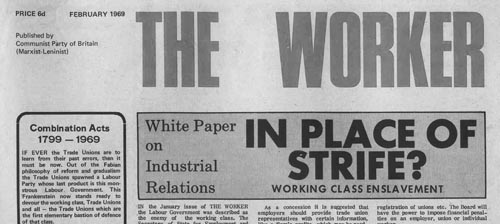In our third article to mark the 40th anniversary of the CPBML by looking at the past four decades through the eyes of Workers and its predecessor, The Worker, we look at the 1969 fight against attempts by the Labour government to shackle the unions...
1969: Labour turns on the trade unions
WORKERS, MAR 2008 ISSUE

Quite soon after the birth of our Party, the social democratic Labour government headed by Wilson followed up an attempted wage freeze by moving to emasculate the trade unions with a set of proposals in a White Paper promulgated under the slogan, In Place of Strife. In the February 1969 issue of our paper, The Worker, our party responded to the government's threat advocating wholesale opposition to the proposed legislation. The first article was headed "Combination Acts 1799" and is reprinted in full. It is followed by extracts from the article "In place of strife?: working class enslavement."
"IF EVER the Trade Unions are to learn from their past errors, then it must be now. Out of the Fabian philosophy of reform and gradualism the Trade Unions spawned a Labour Party whose last product is this monstrous Labour Government. This Frankenstein now stands ready to devour the working class, Trade Unions and all – the Trade Unions which are the first elementary bastion of defence of that class.
The introduction of the Combination Acts in 1799 was the direct evidence that a government is a class power and a class weapon. Notwithstanding all the prattle of freedom in Britain at that time, the ruling class and its Government, alarmed by the awakening of the working class and its industrial army, imposed this repressive measure. A quarter of a century later, through the power of the Unions, it was repealed.
Since that time there has always been the legend that the Unions are serving one interest, the working class, with which the employers are in opposition and conflict, and that the government of the day is not part of either but above the struggle.
The introduction of the White Paper "In Place of Strife" is the resurrection of the Combination Acts with the modern sinister connotation of corporate state fascism. Unless smothered, these proposals will render the Unions kindred to Dr Ley's Labour Front in Nazi Germany.
The Government has conspired with its masters to cheat and defraud the producing masses. It has ignored stock market manipulation, monopoly price-rigging, fiscal speculation; it has actively encouraged and approved the grotesque profits which have been made through gambling, profits from restrictions of production, from closures and mergers and take-overs. It stands committed to the idea that "profits are necessary to industry", it subsidises monopolies to dismiss workers under the Redundancy Act; it cares nothing for the millions of days lost from accidents, sickness and lay-offs, arbitrarily agreed and decided upon by the employers.
"This White Paper incorporates the terrible lie that the state must and does have a role in industrial relations, stands in the middle of two conflicting parties as a mediator, that the laissez-faire of these two parties must end and that the state, the Government, has the responsibility of intervening – all as if it were not directly the product of capitalism and the servant of the capitalist class!

February 1969: The Worker attacks the Labour proposals. In the rising tide of response by the workers to defend such an elementary heritage as trade unionism, whose very existence is now in question, they must beware – beware of the labour lieutenants of capitalism who collude with the Labour Government in the service of capitalism. They will suggest that we might fight the Government's legislation but, in the same breath, they will say we must, as Unions, be more responsible. They argue, we would oppose prison for workers but could accept fines; display demagogic anger about a 90-day cooling-off period and rush to settle for a 28-day cooling-off period. As on the incomes policy question, they will say: reject the Government chains – and fetter yourselves voluntarily."
We must be clear. This issue involves all in working class society, professional workers, workers by hand and brain – everybody who is exploited.
Oppose any attempt to restrict the civil right of strike under any circumstances; and, in the mounting campaign that must and will surely arise, there must also be the political thought "destroy the progenitors of such proposals; destroy the system, capitalism, that brings it about."
"In the January issue of THE WORKER the Labour Government was described as the enemy of the working class. The Secretary of State for Employment had obligingly confirmed this charge with the publication of the White Paper, "In Place of Strife". This White Paper is the Labour Government's blueprint for emasculating the trade unions, depriving the working class of defensive organisation in the industrial struggles that lie ahead and proving itself the faithful servitor of monopoly capitalism.
Ignoring the guff, we can consider the following recommendations of this Policy for Industrial Relations – recommendations which if turned into law will affect for the worse every worker in Britain.
It is proposed to set up a Commission on Industrial Relations which will have an important part to play in trade union reform. Disputes between rival unions for recognition…will be referred to the CIR and the Secretary of State will be empowered to give effect by Order to its recommendations. Financial penalties may be imposed on unions refusing to comply.
Among the proposals which George Woodcock, General Secretary of the TUC, speaking on behalf of the General Council, finds acceptable is the establishment of the Commission on Industrial Relations. The first appointee as full-time chairman of the CIR – George Woodcock!
...In order to incorporate trade unions even more firmly in the governmental superstructure of capitalism, they can apply to the CIR for grants and loans to aid their development along lines recommended by the CIR.
The Secretary of State will be given discretionary power to secure a "conciliation pause" in unconstitutional strikes. Strikers could be ordered to return to work and desist from industrial action for 28 days, subject to financial penalties.
The Secretary of State will be empowered to require unions to hold a ballot on the question of strike action. The Secretary of State would not intervene in the conduct of the ballot apart from giving approval to the form of question to be put to the vote!
Trade unions should register with a new Registrar of Trade Unions and will be required to have rules governing certain matters. Refusal to do so will make a union liable to financial penalties."